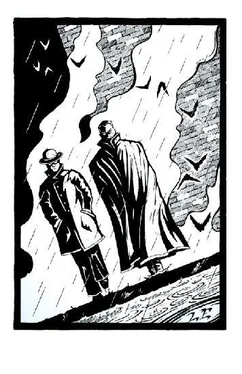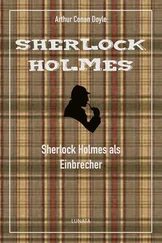“Holmes, you amaze me!”
He waved away the compliment. “I am preparing a monograph on paper and papermaking. It will be an invaluable resource in criminal investigation, and I daresay, had it been available at the time, the Bank Holiday Blackmail Case would have been brought to a far more satisfactory conclusion!”
Holmes withdrew a vial of white crystals and tossed a few into the test tube. “Parchment allowed the great Library at Pergamum to continue operating — until Mark Antony emptied its shelves and made Cleopatra a wedding present of its 200,000 volumes. She was a conniving woman, Watson.” He removed the stopper from a reagent bottle of clear liquid and inserted a glass pipette.
“Now, let us see what this torn leaf has to tell us,” said Holmes. “Brother Eduardo insists the codex was written in blood. If at some time there was blood on this scrap of parchment, a sufficient amount of it has been dissolved into this solution. This reagent will precipitate that blood as a brownish sediment.” He added several drops and swirled the test tube.
“Nothing!” snarled Holmes. “Perfectly clean. So much for legends!”
“What if the legend is true,” asked Watson, “and all trace of the evil writing has vanished?”
“Blood does not simply vanish. Some trace would remain, and my hemoglobin test is capable of detecting blood at concentrations of barely one part in a million.” He smoothed out the parchment and blotted it dry. “Either there was no blood on this parchment to begin with, or…”
Holmes walked to the fireplace and filled his pipe. “How does one prove or disprove the supernatural?” he murmured, dropping into his chair. He took off his shoes and sat cross-legged, smoking his pipe.
Watson awoke at the call of his name. He had dropped off to sleep with The Times in his lap, while Holmes had been puffing at his pipe and, a while later, quietly puttering about his desk.
“Watson, would you mind taking care of something for me?” asked Holmes.
The doctor arose from his chair and stretched. “Run an errand? Yes, of course.”
“I have written out some instructions for you,” he said, extending a folded sheet. “Please read them and make certain everything is clear.”
Watson unfolded the sheet, glanced at his friend’s distinctive scrawl, and gasped. He looked down at Holmes sitting calmly at his desk. The detective’s left hand was wrapped with a handkerchief, his jack-knife and a saucer of dark red liquid at his elbow. Upon the blotter lay a Latin dictionary and the doctor’s service revolver.
Watson dropped the note. His body abruptly stiffened as the most abhorrent idea went racing through his mind. “No!” he cried in genuine terror. A cold sweat broke out over his face, which had gone as white as a sheet. Within seconds he began to shake involuntarily — except for his hands, which he kept tightly clenched by his sides.
Holmes realized the doctor was struggling hard to control himself: his mouth had become a pale trembling line, his eyes two coals burning with hatred. Holmes glanced at the revolver upon the desk, then quickly returned his gaze to the seething volcano of emotion standing before him. His hand moved toward the gun but Watson sprung upon it like a Bengal tiger, snatching the revolver from the desk.
Watson pressed the barrel to Holmes’ forehead and gazed into the detective’s widening eyes. “God help me,” he said, squeezing the trigger.
When the hammer fell Holmes flinched at its sharp click .
Watson dropped the gun upon the desk and crumpled to the floor where he lay sobbing uncontrollably. Holmes lifted him into a chair and handed him a glass of whiskey.
“Holmes! How could you?” he cried.
“My dear friend,” said Holmes, deep concern written upon his features, “please forgive me, but I could turn to no other for such a test. You have a heart that is genuinely good. Fair weather or foul, you are constant in your friendship, and so you have become for me a barometer by which I am able to gauge all that is noble in men.”
“I wanted to kill you! And I would have, had—”
“Had the revolver been loaded, but I have far too much respect for your prowess with a gun to—”
“Did you stop to think I could have bashed in your bloody brains with the butt of it!”
“ That idea,” Holmes said resentfully, “was not written upon the parchment!” He took the empty glass from Watson’s trembling hand and moved to refill it. “Nevertheless,” he said softly, “you are right. It was a dangerous experiment … which might well have proved deadly.” He extended another whiskey to the doctor. “And it was indeed a sin to pull it on my dearest friend.”
Watson wiped his sweat-soaked face and took the glass. “You might have warned me.”
“That would have ruined the whole experiment. Besides, you would have refused to read it.”
Holmes picked up the note where Watson had dropped it. “Astonishing!” he cried. “It is blank again!” He hurried to the microscope to examine the fragment. After a minute he looked up from the eyepiece. “Not a trace of what I wrote — not even an impression made by the pen!”
Holmes walked to the fireplace, the parchment gripped tightly in his clenched fist. “Now that I know the power of the codex is genuine,” he said angrily, “I want to know why the accursed thing was not destroyed centuries ago? All those despicable crimes could have been prevented!”
After several minutes, Holmes coolly remarked, “The apostate monk who created the thing … this Brother Moriarty … in many ways, he was a Napoleon of crime. Even now, hundreds of years after his death, he dispatches his orders on these parchment leaves.”
Holmes gazed at the wrinkled page in his hand. “That miserable bookseller rotting away in jail is a pawn. Whoever mailed this page to him simply wanted to drag a red herring across the trail of my investigation. Whereas it was intended to lead me astray, it has only served to strengthen an earlier suspicion.” He shoved the parchment into the drawer of his desk and locked it. “Watson, are you recovered enough to accompany me to Longbourn?”
“If the codex was half as dangerous as you claimed, you should have destroyed it when it first came into your possession,” said Holmes.
“For hundreds of years we Benedictines have devoted ourselves to the preservation of books,” said Brother Eduardo. “The codex is one of a kind. Destroying it would have been a crime.”
“But by not destroying it,” said Watson, “you and your brothers are indirectly responsible for far worse crimes.”
“But we have worked hard to keep the book from being read.”
“And yet it has been read,” said Holmes.
“True, there have been two or three times when the codex was not in our possession.”
“I believe there have been many times,” said Holmes. “Your monograph was published over a decade ago. I believe it needs extensive updating. The Whitechapel murders, for instance. Who was reading your book in 1888?”
“The codex did escape that year … for several months,” said the monk, unable to meet Holmes’ gaze. “But we have tried so hard. We have cared for it for centuries.”
“Cared for it?” asked Watson.
“The Brotherhood considers the codex to be a living thing,” said Father Twitchell.
“At first,” said Brother Eduardo, “our order saved the book from the fire because of its rarity. Years later, we made a startling discovery about the nature of the codex. It had developed a form of intelligence.” He paused. “We believe it has a living soul.”
“You are quite mad,” said Holmes.
Читать дальше












